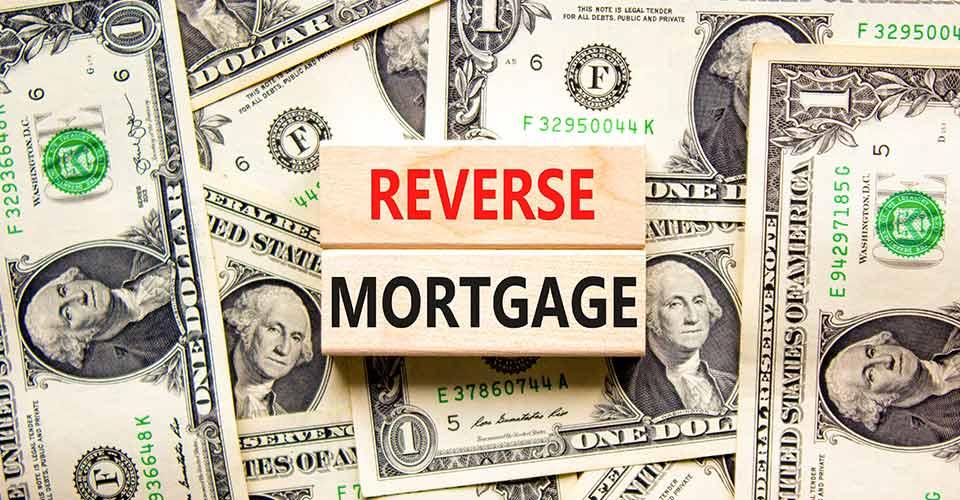Homeowners age 62 or older can use a reverse mortgage to tap into their home equity without selling the house or making monthly payments. A lender gives you an advance on your home equity, paying you in a lump sum, monthly payouts, or a line of credit.12 Over the loan term, your debt increases, your home equity decreases, and interest and fees accrue.
Unlike a traditional (or forward) mortgage, the loan doesn’t become due until you sell the home, move out, fall behind on property charges, or die. If your spouse dies with a reverse mortgage, your next steps depend on whether you’re a co-borrower on the loan or an eligible or ineligible non-borrowing spouse.3
KEY TAKEAWAYS
- A reverse mortgage is for homeowners age 62 or older who want to tap into their home equity without selling the house or making monthly payments.1
- The loan and interest become due when you sell the home, move out, fall behind on property charges, or pass away.4
- Eligible non-borrowing spouses can continue living in the home after the borrower dies, but they won’t receive more loan proceeds.5
- Anyone who is qualified can be a co-borrower on a reverse mortgage, including a spouse, partner, or roommate who lives with you.
- If a spouse dies with a reverse mortgage, the next steps depend on whether the surviving spouse is a co-borrower or an eligible or ineligible non-borrowing spouse.
Nearly all reverse mortgages are home equity conversion mortgages (HECMs), insured by the Federal Housing Administration (FHA) and offered by FHA-backed lenders. The rules described here apply to HECMs, so if you have a different type of loan, then these protections may not apply. Review your reverse mortgage contract and consult an experienced attorney if you have questions or concerns.
How Your Age Affects a Reverse Mortgage
First, some background about reverse mortgages. You must be at least 62 years old to get an HECM (some proprietary reverse mortgage lenders accept borrowers as young as 55).1 However, your age—and that of your spouse or co-borrowers on the loan—influence the amount that you can get out of a reverse mortgage. That’s because the loan balance increases over time, so the longer that a borrower or non-borrowing spouse lives in the home, the greater the chance that the loan balance will exceed the home’s value. And since you can’t ever owe more than the home’s value, that’s a situation that the FHA wants to avoid.
A reverse mortgage’s net principal limit is the total proceeds that you receive before paying off existing mortgages, closing costs, and property charges due at closing.
In general, loans with older borrowers, higher-valued homes, and lower interest rates have higher principal limits and vice versa. The principal limit is based on the age of the youngest borrower or eligible non-borrowing spouse.2
If Your Spouse or Partner Is a Co-Borrower
After a borrower dies, any co-borrower on the loan continues to receive the benefits of the reverse mortgage—including loan payouts. Additionally, co-borrowers can stay in the home for as long as they wish, provided that they fulfill the ongoing loan obligations.5 A spouse or partner who meets the borrowing requirements generally should be listed as co-borrowers on a reverse mortgage to take advantage of these protections.
Under reverse mortgage loan terms, you must stay current with your ongoing property charges, including property taxes, homeowners insurance, flood insurance premiums, homeowners association (HOA) fees, and other special assessments.
If Your Spouse or Partner Isn’t a Co-Borrower
When a spouse or partner of a deceased reverse mortgage holder isn’t listed as a co-borrower on the loan documents, they can stay in the home if they pay off the loan—but they typically pay off the loan by selling the house and finding a new place to live. However, a surviving spouse may be able to remain in the home without settling the debt, depending on whether they are an eligible or ineligible non-borrowing spouse and when the loan originated. Here’s a rundown.
A non-borrowing spouse is just what it sounds like: a spouse who is not a borrower on a reverse mortgage agreement. While there are several reasons why a spouse would be a non-borrower, the most common is age: You must be at least 62 to qualify as a borrower or co-borrower of an HECM.7
Reverse Mortgages Originated Before Aug. 4, 2014
Non-borrowing spouses have fewer protections for reverse mortgage loans originated before Aug. 4, 2014.8 If the borrower moves into a healthcare facility or dies, the lender or loan servicer can choose to:
- Foreclose on the home (a non-borrowing spouse who is actively trying to sell the house or pay off the debt can request a delay of the foreclosure for up to 180 days), or
- Enter a process called “Mortgagee Optional Election (MOE) Assignment,” which allows an eligible non-borrowing spouse to remain in the house.9
Reverse Mortgages Originated on or After Aug. 4, 2014
If a borrower dies or moves into a healthcare facility, their lender (or loan servicer) will determine if their spouse, who is not a co-borrower, is an eligible or ineligible non-borrowing spouse. A spouse who qualifies under U.S. Department of Housing and Urban Development (HUD) rules as an eligible non-borrowing spouse receives a couple of important protections for reverse mortgages originated on or after Aug. 4, 2014.8 Under HUD program updates, eligible non-borrowing spouses:
- Can remain in the home after their spouse dies or moves into a healthcare facility without repaying the loan balance. The deferral period remains in effect as long as the surviving spouse lives in and maintains the home and pays the property charges.
- No longer have to establish a marketable title or demonstrate their legal right to remain in the home following their spouse’s death, making it easier for non-borrowing spouses to establish deferral eligibility.
While non-borrowing spouses continue benefiting from the protections built into the loan, they don’t receive any remaining loan funds. Instead, the payouts stop, and any credit lines are closed when the borrowing spouse passes away.
Eligible Non-Borrowing Spouses
To qualify as an eligible non-borrowing spouse, your spouse must:
- Have been married to you when you signed the loan documents and stayed married to you until your death.
- Have been identified in the loan documents as a non-borrowing spouse.
- Have lived in the home as their principal residence even after you move out or die.
- Meet the ongoing loan requirements.8
Same-sex couples who were unmarried due to state laws when they got a reverse mortgage have eligible non-borrowing spouse protections if they marry before the borrower dies or moves into a healthcare facility for more than 12 consecutive months.10
Ineligible Non-Borrowing Spouses
An ineligible non-borrowing spouse is a non-borrowing spouse who doesn’t meet the above eligibility requirements. An ineligible non-borrowing spouse has no protections allowing them to remain in the home if the borrowing spouse dies or permanently moves out to enter a healthcare facility.
According to the Consumer Financial Protection Bureau (CFPB), you should seek legal advice if you think that your spouse should be on your reverse mortgage loan. If your spouse isn’t on the loan, talk to a lawyer about transferring the property to your spouse when you pass away.3
Can you outlive a reverse mortgage?
No, the loan is not due until the last borrower on the reverse mortgage loan agreement sells the home, moves out, stops paying taxes and insurance, stops maintaining the house, or dies. So, if you stay current with those payments and basic maintenance, then you can live in the house for as long as you wish without repaying the loan.
What happens if my reverse mortgage lender goes out of business?
If you have a home equity conversion mortgage (HECM)—the most common reverse mortgage—your terms will not change. That’s because the loan is covered by government insurance. You will still receive your agreed-upon payouts as long as you fulfill the loan obligations.
Can I change my mind after closing on a reverse mortgage loan?
You have a three-day “rescission period” after closing to cancel the reverse mortgage without owing any interest. If you cancel after that, you must pay back the loan amount that you already received plus any accrued interest.11
The Bottom Line
Before HUD made changes to its HECM program in 2014, non-borrowing spouses had to either pay off or refinance the loan—or give up the home. However, for loans originated on or after Aug. 4, 2014, eligible non-borrowing spouses can remain in the house for as long as they wish, provided that they fulfill the loan obligations.8
If you’re having trouble with a reverse mortgage, the CFPB recommends that you:
- Talk to a HUD-approved housing counselor.
- Consult an attorney (you may qualify for free legal services; visit lsc.gov to find a legal aid office).
- Contact Area Agencies on Aging (AAA) to find state and local assistance programs that may be able to help you pay for property charges and home repairs.
- Submit a complaint to the CFPB if you’re having problems with your lender or servicer.





